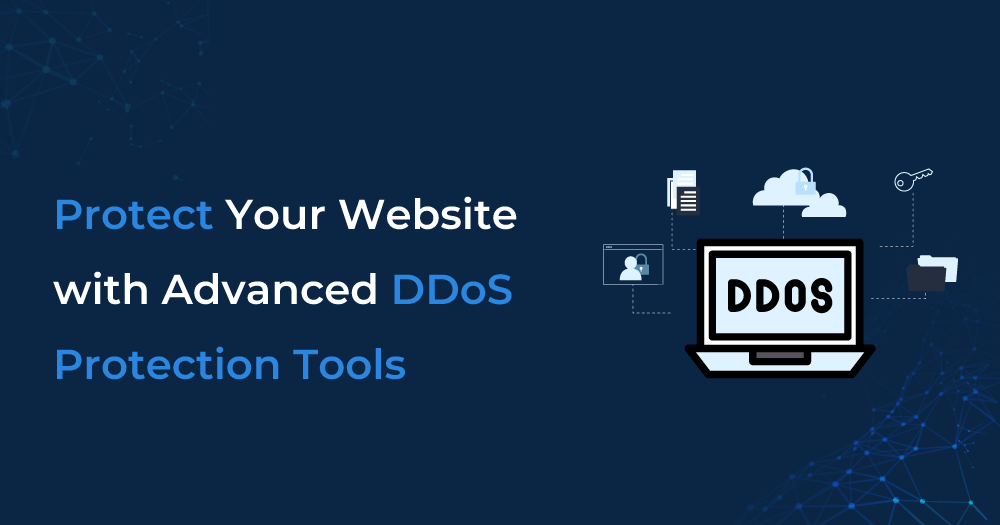The security of websites is crucial in the current digital era. Because there are an increasing number of online companies and services, websites are now frequently the focus of harmful assaults. The Distributed Denial of Service (DDoS) attack is among the most damaging types of cyberattacks. We’ll look at how DDoS security systems can shield your website from these harmful attacks in this blog, so it stays fast, safe, and functional.
What is a DDoS Attack?
A DDoS attack is a cyberattack where multiple systems flood the targeted website’s server with an overwhelming volume of traffic. The goal is to exhaust server resources, causing the site to crash or become unavailable to legitimate users. These attacks are often coordinated by large networks of compromised devices, known as botnets, which can generate thousands of requests per second.
DDoS attacks can be highly disruptive, leading to:
- Website downtime
- Loss of revenue
- Damage to brand reputation
- Security vulnerabilities
Because of the scale and speed at which these attacks occur, it is vital to have proper DDoS protection tools in place.
The Importance of DDoS Protection
When your website goes down due to a DDoS attack, it not only disrupts your business but can also severely impact customer trust. Websites that frequently experience downtime can lose credibility and customers quickly. Implementing DDoS protection ensures that your website remains up and running, even under attack, maintaining performance and safeguarding critical data.
Here’s why advanced DDoS protection is crucial:
- Uninterrupted Service: DDoS protection ensures your website remains accessible to legitimate users during an attack, minimizing downtime and losses.
- Reduced Revenue Loss: If your website is an e-commerce platform or service provider, downtime can directly affect revenue. DDoS protection tools help you avoid costly outages.
- Brand Reputation: Frequent disruptions can hurt your brand’s reputation. By having strong protection in place, you demonstrate reliability and trustworthiness to your customers.
- Enhanced Security: DDoS attacks can be a gateway to more severe security breaches. Protection tools can thwart these threats before they escalate.
How Do DDoS Protection Tools Work?
DDoS protection tools function by detecting and mitigating malicious traffic before it reaches your server. Here’s a breakdown of how these tools typically operate:
- Traffic Filtering: DDoS protection services monitor incoming traffic and separate legitimate traffic from malicious attempts. This ensures that only real users access your site.
- Rate Limiting: These tools limit the number of requests per second allowed from each source, preventing a flood of malicious requests.
- Traffic Analysis: Advanced DDoS protection tools use AI and machine learning to analyze traffic patterns and identify suspicious behavior. By understanding normal traffic, they can quickly spot anomalies and react before damage is done.
- Load Balancing: Some solutions spread traffic across multiple servers, distributing the load and preventing a single point of failure.
Choosing the Right DDoS Protection Solution
There are a variety of DDoS protection tools available, each with its strengths. When selecting a solution for your website, consider the following factors:
- Scalability: Your DDoS protection should be scalable to handle both small and large-scale attacks. As your website grows, the protection should grow with it.
- Comprehensive Protection: Look for tools that offer protection across different types of DDoS attacks, including volumetric, protocol, and application layer attacks.
- Cloud-Based vs. On-Premise: Cloud-based DDoS protection solutions are often more flexible and cost-effective for most businesses. However, some companies may prefer on-premise solutions for tighter control over their infrastructure.
- Real-Time Monitoring: Ensure the tool provides real-time monitoring and instant alerts in the event of an attack, allowing you to respond swiftly.
Popular DDoS Protection Tools
Several reliable DDoS protection tools are available on the market today, each offering robust features. Among the most well-liked choices are:
- Cloudflare: A well-known DDoS protection provider that offers a global network capable of blocking large-scale attacks.
- AWS Shield: Amazon’s solution for businesses operating on its cloud platform. It offers two levels of protection: AWS Shield Standard and Advanced.
- Akamai Kona Site Defender: Known for its ability to mitigate sophisticated DDoS attacks, it combines traffic filtering and advanced machine learning.
- Imperva: This solution provides both application and network layer DDoS protection, ideal for large websites and businesses.
- Arbor Networks: A powerful tool designed to handle massive volumetric attacks and prevent service interruptions.
Best Practices for DDoS Protection
In addition to investing in DDoS protection tools, there are several best practices to further strengthen your website’s defense:
- Regular Monitoring: Continuously monitor your website’s traffic for irregular spikes that could indicate an impending attack.
- Backup and Redundancy: Ensure that you have a solid backup plan and redundancy measures in place to recover quickly if an attack occurs.
- Update Software: Keep all your web applications, plugins, and servers up-to-date to minimize vulnerabilities that attackers can exploit.
Create an Incident Response Plan: Develop a clear response strategy so that your team knows how to act in the event of a DDoS attack.
Conclusion
DDoS attacks are a growing threat in the digital world, but you don’t have to be a victim. By deploying advanced DDoS protection tools, you can safeguard your website from downtime, protect your revenue, and maintain your reputation. With the right solution in place, your website will remain fast, secure, and reliable – even when under attack.
Invest in a robust DDoS protection system today, and ensure the continuity of your online presence tomorrow.
